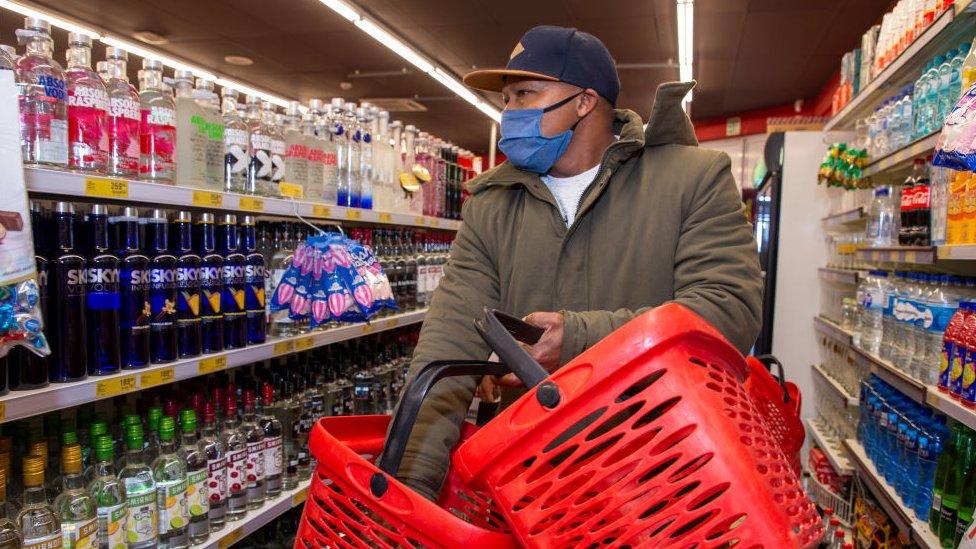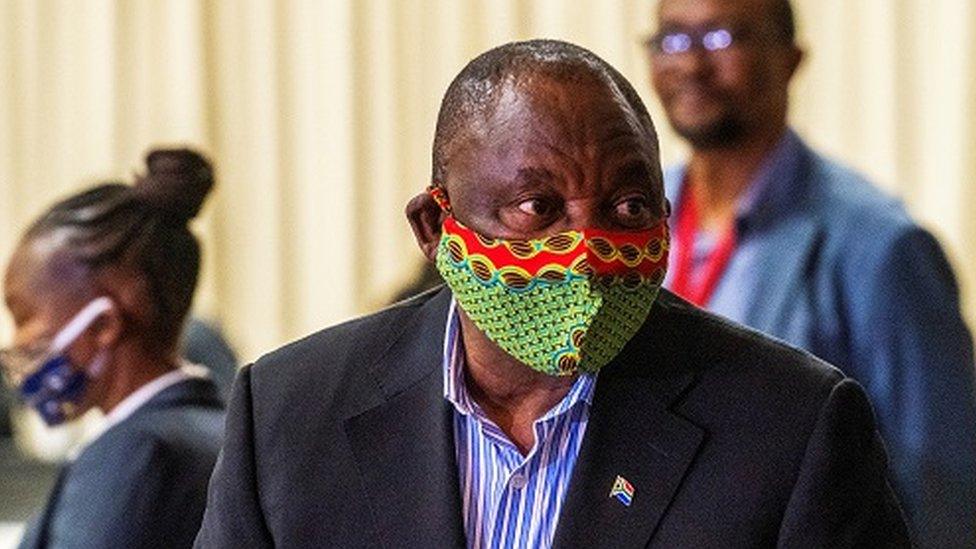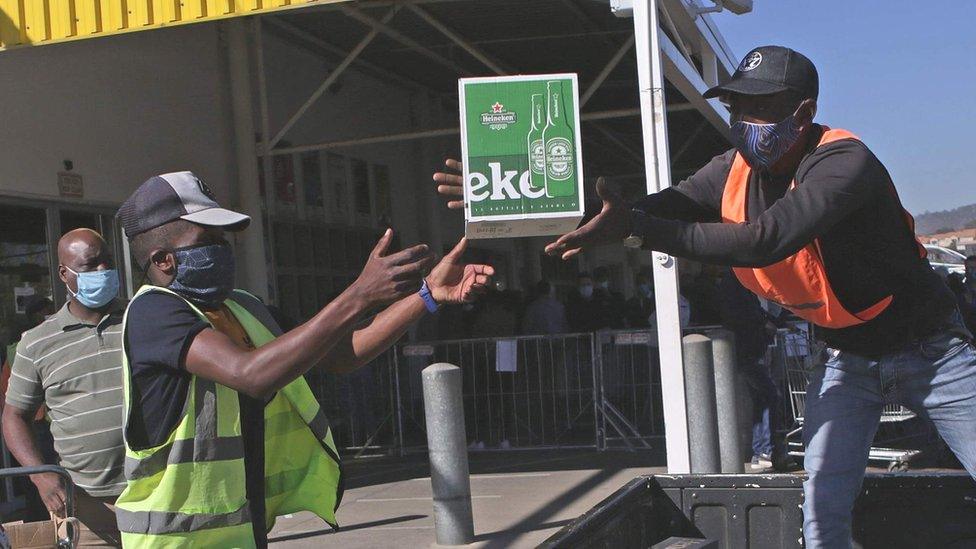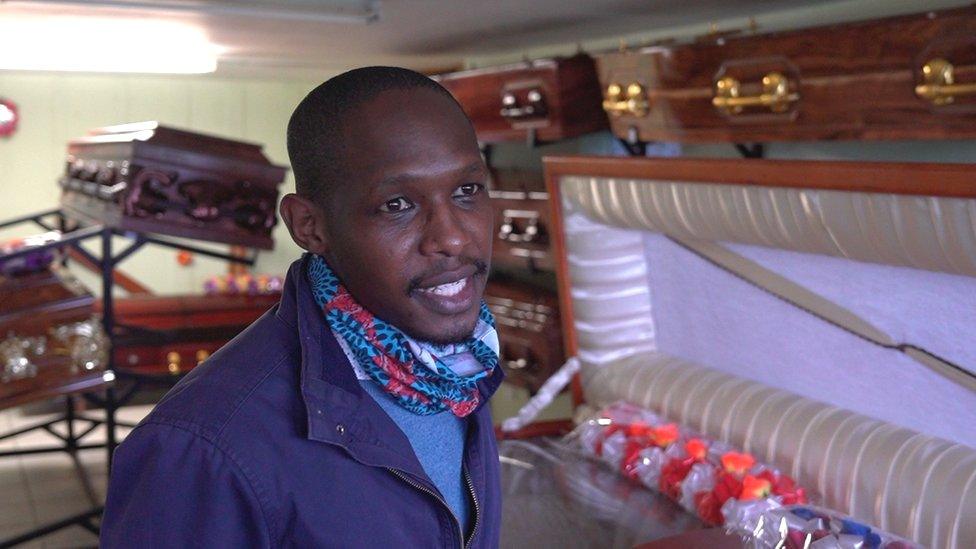Coronavirus: South Africans divided over second alcohol ban
- Published

The authorities say the ban will take pressure off the healthcare system
The reintroduction of a ban on the sale of alcohol in order to help curb the spread of coronavirus has divided South Africans.
President Cyril Ramaphosa said the ban - the second this year - would take pressure off the health system.
While some backed him, others said he was blaming citizens for his government's failures.
When it comes to coronavirus, South Africa is the hardest-hit country in Africa with more than 275,000 cases.
Deaths resulting from Covid-19 have also risen to more than 4,000, and government projections estimate this could increase to 50,000 by the end of the year.
The main opposition party, the Democratic Alliance, said the government was using the alcohol ban as a scapegoat for its failure to provide adequate health care.
Julius Malema, the leader of the opposition Economic Freedom Fighters, tweeted that the president had failed to heed his warning not to lift the alcohol ban first imposed in March.
He added that Mr Ramaphosa should also close schools which resumed last month after several weeks.
On Twitter, people are using the hashtag #AlcoholHasFallen to express their support or displeasure for the president, who announced the renewed alcohol ban on Sunday night.
Some South Africans pondered how the ban could affect the economy.
One woman highlighted how people involved in the hospitality industry would be losing work.
"After almost two years of not working, my sister finally found a job, sadly her job ended last night," she tweeted.
Allow X content?
This article contains content provided by X. We ask for your permission before anything is loaded, as they may be using cookies and other technologies. You may want to read X’s cookie policy, external and privacy policy, external before accepting. To view this content choose ‘accept and continue’.

Another Twitter user posted a short video played over a sad song and saying farewell to alcohol:
Allow X content?
This article contains content provided by X. We ask for your permission before anything is loaded, as they may be using cookies and other technologies. You may want to read X’s cookie policy, external and privacy policy, external before accepting. To view this content choose ‘accept and continue’.

However, people supporting the president said the ban would help deal with anti-social behaviour:
Allow X content?
This article contains content provided by X. We ask for your permission before anything is loaded, as they may be using cookies and other technologies. You may want to read X’s cookie policy, external and privacy policy, external before accepting. To view this content choose ‘accept and continue’.

Allow X content?
This article contains content provided by X. We ask for your permission before anything is loaded, as they may be using cookies and other technologies. You may want to read X’s cookie policy, external and privacy policy, external before accepting. To view this content choose ‘accept and continue’.

And some have joked that South Africans should get their homebrew kits out again after there was a reported rise in homemade pineapple-based alcohol during the last ban.
Allow X content?
This article contains content provided by X. We ask for your permission before anything is loaded, as they may be using cookies and other technologies. You may want to read X’s cookie policy, external and privacy policy, external before accepting. To view this content choose ‘accept and continue’.

President Ramaphosa also announced a night-time curfew and said the wearing of masks outdoors was now compulsory.


Coronavirus infections have skyrocketed in the past two weeks, straining the health system, especially state hospitals which 80% of the population depend on.
They are simply running out of beds and part of that, according to health experts, is due to alcohol-related trauma cases.
More than 40% of the 40,000 trauma cases recorded here in a week are alcohol-related - something the health system cannot afford right now.
The alcohol ban, however, also affects jobs of those who are directly or indirectly dependent on the industry.
For the authorities, it has come down to a crude balance between saving lives and preserving livelihoods - and it is an impossible dance.

Last week, South Africa recorded the highest-ever single-day increase in cases. Nearly half were in Gauteng, a province that is becoming the outbreak's epicentre.
In his address, Mr Ramaphosa acknowledged "most" people had taken action to help prevent the spread, but he said there were still some who acted "without any responsibility to respect and protect each other".

President Cyril Ramaphosa said South Africa was facing a storm
"There are a number of people who have taken to organising parties, who have drinking sprees, and some who walk around crowded spaces without wearing masks," said the president.
Mr Ramaphosa said the new measures were being introduced to help the country to weather the storm of coronavirus, and a state of emergency would be extended until 15 August. The night-time ban would be in place from 21:00 to 04:00.
The government has also made 28,000 hospital beds available for Covid-19 patients. But President Ramaphosa said the country still faced a "serious" shortage of more than 12,000 healthcare workers, including nurses, doctors and physiotherapists.
The alcohol ban comes just weeks after another three-month ban was lifted in an effort to prevent drunken fighting, cut domestic violence and eliminate weekend binge-drinking prevalent across South Africa.
Doctors and police say the previous ban contributed to a sharp drop in emergency admissions to hospital. But the country's brewers and wine makers complained they were being driven out of business.
South Africa's province of Gauteng has become the epicentre of coronavirus cases in the country
- Published1 June 2020

- Published3 July 2020
